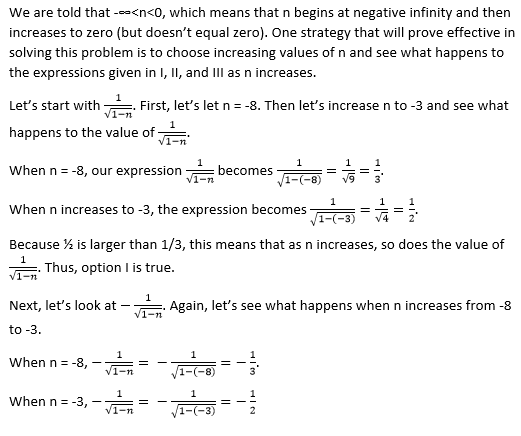All SAT Math Resources
Example Questions
Example Question #451 : Arithmetic
Which of the following is greater than 1/2 ?
2/5
9/19
8/17
6/11
4/9
6/11
There are two ways to deal with fractions. One way is to convert them all to decimals. (By using your calculator, divide the numerator by the denominator). Using this method all you would need to do is to see which is greater than 0.5. Otherwise to see which is greater than 1/2, double the numerator and see if the result is greater than the denominator. In B, the correct answer, doubling the numerator gives us 12, which is bigger than 11.
Example Question #1 : How To Order Fractions From Least To Greatest Or From Greatest To Least
Which of the following has the greatest value?
5/8
65%
52%
4/7
65%
If all are converted to decimals, 0.65 is the biggest.
Example Question #3 : How To Order Fractions From Least To Greatest Or From Greatest To Least
Which fraction falls between ½ and 3/4?
4/5
3/6
5/8
1/3
6/8
5/8
The easiest method is to put each of these fractions into a calculator, and then place them in order on a number line to see which value falls in between 1/2 = 0.5 and ¾ = 0.75. Without a calculator you must do long division to find the value of the numerator (top number) divided by the denominator (bottom number) for each fraction. You can actually eliminate answers b. and d. because they are equal to 1/2 and ¾ respectively. 4/5= 0.80, 3/6 = 0.5, 5/8= 0.625, 6/8 = 0.75.
Example Question #2 : How To Order Fractions From Least To Greatest Or From Greatest To Least
If Ben is taller than Jaime, Mary is taller than Ben, and Chris is taller than Mary. Who is the second tallest?
Ben
Not possible to tell
Jaime
Chris
Mary
Mary
Using math symbols to dictate height we find that Ben>Jaime, Mary>Ben, Chris>Mary. Putting these in order we have Chris>Mary, Mary>Ben, Ben>Jaime. This shows that Mary is the second tallest.
Example Question #5 : How To Order Fractions From Least To Greatest Or From Greatest To Least
Order the following fractions in descending order.
1/2, 2/3, 2/5, 3/4, 4/7
2/5, 1/2, 4/7, 2/3, 3/4
3/4, 2/3, 4/7, 1/2, 2/5
1/2, 2/3, 2/5, 3/4, 4/7
2/5, 1/2, 3/4, 4/7, 2/3
2/3, 4/7, 3/4, 1/2, 2/5
3/4, 2/3, 4/7, 1/2, 2/5
Method 1:
Find the common denominator (420) and convert each fraction to this denominator:
1/2 = 210/420
2/3 = 280/420
2/5 = 168/420
3/4 = 315/420
4/7 = 240/420
Now sort by numerator, largest to smallest.
Method 2:
Divide each fraction to obtain a decimal. Sort the decimals, largest to smallest.
Example Question #23 : General Fractions
I and II only
I only
I and III only
II and III only
II only
I and III only
Example Question #1 : Ordering Fractions
Which of the following fractions is between 0.2 and 0.3?
The other three choices are larger than 0.3.
Example Question #8 : How To Order Fractions From Least To Greatest Or From Greatest To Least
Which of the following fractions is the greatest?
The trick to this problem is to see that three of the choices have the numerator and denominator 3 units apart. The other two choices can be made three units apart as well- multiply both 




The trick is that once all fractions are the same units apart in denominator and numerator, the biggest number is the largest fraction.
Example Question #9 : How To Order Fractions From Least To Greatest Or From Greatest To Least
Order the following from least to greatest: three-fifths, seven-eighths, 0.5, sixteen-eighteenths, 97%, 17-fifths.
three-fifths, 
















We need to order: three fifths, seven eights, 0.5, sixteen eighteenths, 97%, seventeen fifths.
Let us re-write each as a fraction: 





Example Question #10 : Fractions
Which of the following fractions is less than 
The purpose of this question is to find understandable values of fractions, which must be done using a common scale. Since looking at the denominators in the answers shows that there are many different numbers, decimal values would be easier to use.
The decimal equivalencies are as follows:
Therefore, we know that 



All SAT Math Resources
































